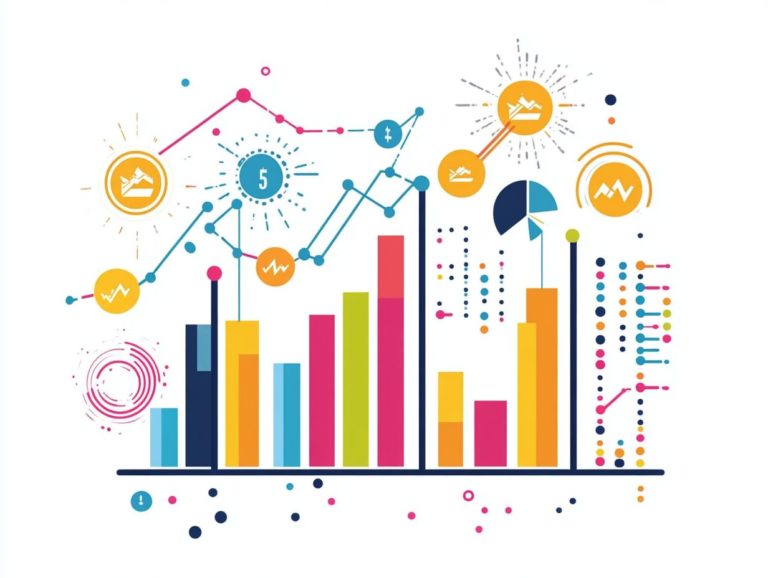Implementing CRM in Nonprofit Organizations
In the constantly changing world of nonprofit organizations, managing relationships and resources effectively is essential for your success.
Customer Relationship Management (CRM) systems provide you with powerful tools to enhance donor relationships, streamline operations, and elevate your fundraising efforts.
This article delves into the essentials of CRM, showcasing its benefits while addressing the common challenges that come with implementation.
You will be guided through the steps necessary to select the right CRM system and train your team, all while emphasizing the importance of measuring success and adapting based on feedback.
Discover how CRM can transform your nonprofit’s mission and amplify its impact.
Contents
- Key Takeaways:
- Why CRM is Essential for Nonprofits
- Benefits of Implementing CRM in Nonprofits
- Challenges of Implementing CRM in Nonprofits
- Steps for Successfully Implementing CRM in Nonprofits
- Measuring Success and Continuously Improving CRM
- Frequently Asked Questions
- Why is CRM vital for nonprofits?
- How can CRM benefit a nonprofit organization?
- What are some common challenges in implementing CRM in nonprofit organizations?
- What are the key features to look for in a CRM system for a nonprofit organization?
- How can a nonprofit organization ensure a successful implementation of CRM?
- Are there any free or low-cost CRM options for nonprofit organizations?
Key Takeaways:

- Improved donor relationships and fundraising.
- Streamlined operations save time and resources.
- Successful CRM implementation requires assessing needs and continuous adaptation.
Why CRM is Essential for Nonprofits
Customer Relationship Management (CRM) systems play a crucial role for NGOs and nonprofits. They enable you to interact more effectively with donors and volunteers while streamlining your fundraising efforts, especially when considering the 5 best CRMs for nonprofits.
In today s fast-paced environment, embracing CRM technology can greatly enhance your organization s growth. It optimizes how you manage data and allows for personalized approaches to stakeholder engagement.
Integrating cloud-based solutions fosters efficient communication and collaboration within your teams. This significantly amplifies your organization s impact as you work to fulfill your mission.
Defining CRM and Its Importance in Nonprofits
CRM, or Customer Relationship Management, is your strategic ally in navigating interactions with donors and enhancing your fundraising endeavors. This powerful tool not only tracks contributions but also keeps detailed records of interactions and preferences, streamlining donor management.
With CRM systems at your disposal, you can craft personalized communication tailored specifically to each donor’s interests.
By leveraging data analytics, you can gain invaluable insights into donor behaviors. This enables you to refine your fundraising strategies and target your outreach more effectively.
With these functionalities in play, you can cultivate deeper connections with your supporters. This ultimately amplifies your fundraising potential and ensures long-term sustainability and growth.
Benefits of Implementing CRM in Nonprofits
Unlock transformative benefits by implementing a CRM system in your nonprofit today! You’ll experience enhanced fundraising efforts, improved donor retention, and streamlined processes through the power of automation with CRM software for nonprofits.
This strategic move optimizes your workflow and helps cultivate lasting relationships with your supporters, driving your mission forward.
Improving Donor Relationships and Fundraising
A robust CRM system significantly enhances your donor relationships. It enables personalized communication, which is essential for increasing contributions and ensuring ongoing support.
By effectively profiling your donors, these systems allow your fundraising teams to tailor marketing campaigns that resonate with individual interests and motivations. This level of customization fosters stronger connections and facilitates effective engagement strategies.
Maintaining comprehensive communication records within the CRM allows you to track interactions over time. This ensures that no relationship falls through the cracks.
Utilizing data analytics enables your organization to gain valuable insights that inform your fundraising strategies. This helps you identify trends, measure campaign success, and ultimately drive better results in your development efforts.
Streamlining Operations and Communication

The integration of CRM (Customer Relationship Management) systems enhances internal communication and automates various processes. This significantly boosts operational efficiency within your nonprofit.
By automating tasks like event management, you can effortlessly track registrations, manage volunteers, and oversee logistics. This ensures that each event runs smoothly.
CRM also improves program management by consolidating data on service delivery and outcomes. This allows you to make real-time updates and better-informed decisions.
This promotes collaboration among staff and volunteers, as everyone can easily access crucial information. This reduces the risk of miscommunication.
As you streamline operations, you’ll save time and resources. You’ll also strengthen your capacity for outreach and impact, ultimately driving your organization’s growth.
Challenges of Implementing CRM in Nonprofits
Implementing CRM systems brings a wealth of benefits. However, nonprofits and NGOs encounter various challenges, particularly when it comes to implementing CRM in the education sector.
You may find yourself handling data protection issues, the need for seamless software integration, and staff resistance to change. Addressing these hurdles is essential for reaping the rewards of a robust CRM solution.
Common Obstacles and How to Overcome Them
Common obstacles in implementing CRM systems include inadequate data management practices, insufficient training, and lack of involvement from everyone affected by the CRM.
To tackle these challenges head-on, initiate comprehensive training programs tailored to the diverse needs of your staff. This encourages ongoing learning.
By enhancing data management and analysis capabilities, you can significantly improve your CRM functionalities.
Clearly communicating the benefits of these systems to all involved is crucial. This demonstrates the value these tools bring to day-to-day operations.
Furthermore, involving everyone in the decision-making process promotes buy-in and ensures their perspectives are considered. This teamwork boosts adoption rates and helps everyone feel included, ultimately enhancing your CRM implementation’s effectiveness.
Steps for Successfully Implementing CRM in Nonprofits
Successfully implementing a CRM system requires a thoughtful approach.
Begin by thoroughly assessing your organization s needs. Ensure you select a CRM solution tailored to those specific requirements.
Assessing Needs and Choosing the Right CRM System
Assessing your nonprofit’s specific needs is crucial when selecting the right CRM system. Choose one that offers integrated solutions and necessary customization.
Carefully evaluate factors like scalability to ensure the CRM you choose will grow with your ambitions and expand its functionalities as needed.
Ease of use is also vital; a user-friendly interface can enhance team adoption and reduce the learning curve.
Consider cloud-based options for flexibility and accessibility, as they allow your staff to work from various locations.
Ultimately, these considerations help you select a system that meets your current demands and adapts seamlessly to future requirements.
Training and Onboarding Staff

Effective training and onboarding are essential for harnessing the capabilities of your CRM. This ensures a seamless user experience during implementation.
Prioritize hands-on training sessions that allow you to engage with the CRM software in a practical environment. These interactive sessions build confidence and enhance retention of learned skills.
Ongoing support is critical; quick access to resources or mentorship enables you to troubleshoot challenges independently.
Don t underestimate the significance of user-friendly interfaces, as they dramatically reduce the learning curve. By integrating these best practices, you can maximize your CRM’s potential, resulting in improved customer interactions and heightened productivity.
Measuring Success and Continuously Improving CRM
To maximize the effectiveness of CRM systems in nonprofits, prioritize measuring success through key metrics. Continuously refining your processes using data analytics helps drive meaningful improvements and ensures your organization thrives.
Key Metrics to Track and Analyze
Key metrics like donor retention rates, engagement levels, and the effectiveness of fundraising campaigns are essential for analyzing the success of your CRM systems. These metrics offer crucial insights into how well your CRM tool meets the needs of your organization in building and nurturing relationships with your supporters.
For example, tracking donor retention rates helps you understand loyalty trends and pinpoint areas needing improvement. Monitoring engagement levels reveals how effectively your system connects with its audience, whether through personalized communication or targeted outreach.
Evaluating the effectiveness of your fundraising campaigns allows you to analyze various strategies and refine your approach based on results from data. Each metric reflects your current performance and informs your future decision-making.
Adapting to Changes and Feedback
Adapting to changes and using feedback is essential for the continuous improvement of CRM systems within nonprofits. Actively seek insights from both staff members and key stakeholders to pinpoint gaps and areas for enhancement, crafting a more robust platform that caters to diverse needs.
Regular surveys, feedback sessions, and open forums cultivate a culture where input is valued and thoughtfully considered. Always prioritize data protection to keep sensitive information safe throughout the process.
By skillfully balancing user needs with stringent data security measures, you create a CRM environment that fosters engagement while upholding trust and compliance with regulations, ultimately driving the success of your mission.
Frequently Asked Questions
Why is CRM vital for nonprofits?

CRM, or customer relationship management, plays a crucial role in helping nonprofit organizations manage relationships with donors, volunteers, and other stakeholders. It allows for efficient communication, data tracking, and implementing CRM in a remote work environment to ensure personalized engagement with supporters.
How can CRM benefit a nonprofit organization?
Implementing CRM in nonprofit organizations can bring a range of benefits, including improved donor retention, increased donations, streamlined communication, and better data management. For startups, implementing CRM in a startup environment can also help in creating targeted and personalized campaigns.
What are some common challenges in implementing CRM in nonprofit organizations?
Common challenges in implementing CRM in the retail sector include limited resources, resistance to change, and lack of technical expertise. Careful planning and strategizing are important to overcome these challenges and ensure a successful implementation.
What are the key features to look for in a CRM system for a nonprofit organization?
When selecting a CRM system for a nonprofit organization, look for features such as donor management, volunteer management, event management, email marketing, and reporting. These features can help effectively manage relationships and achieve fundraising goals.
How can a nonprofit organization ensure a successful implementation of CRM?
A successful implementation of CRM in the financial sector requires careful planning, clear communication, and buy-in from all stakeholders. Involve staff members in the process, provide training and support, and continuously gather feedback to make necessary adjustments.
Are there any free or low-cost CRM options for nonprofit organizations?
Yes, several free or low-cost CRM options are available for nonprofit organizations, such as CiviCRM, Zoho CRM, and Agile CRM. These systems may have limited features compared to paid options but can still provide valuable support for managing relationships and fundraising efforts.
Ready to transform your nonprofit’s CRM? Contact us today!






